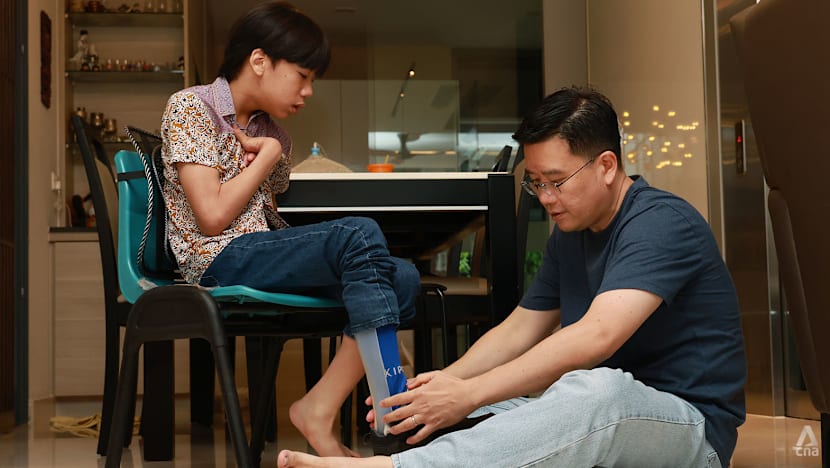Top Stories
Singapore’s Caregivers Juggle Dual Roles Amid Growing Demands

In Singapore, many employees are finding themselves managing dual responsibilities as both workers and caregivers. Ms. Jacqueline Ang, a 49-year-old technical manager, exemplifies this growing trend. While she is officially employed by a university, her reality is that she juggles full-time work with caring for her three daughters—two of whom are 23-year-old twins with autism—and her 75-year-old mother-in-law.
Every weekday begins at 5:30 a.m. for Ms. Ang, who prepares for her day before embarking on a lengthy commute to drop one of her daughters at a day activity centre in Sengkang. With limited options available closer to home, she navigates a challenging schedule that sees her returning to her office or working from home after dropping her daughter off. Once her workday concludes, Ms. Ang’s duties turn to caregiving: driving her daughters to training sessions and managing their daily needs. Despite having two domestic workers, the majority of caregiving tasks rest on her shoulders.
The situation became even more strained when her husband suffered a stroke in September 2022, leading to a three-month hospitalisation and ongoing medical care upon his return home. Reflecting on her circumstances, she noted, “Last year, after my husband’s stroke, I was shaking my head and saying, ‘Jialat’ (which means ‘tough’ in Hokkien), I’m a caregiver for four (persons with) special needs.”
As Singapore evolves into a “super-aged” society, more individuals are likely to face similar challenges of balancing work commitments with caregiving responsibilities. According to a 2022 study by the National Council of Social Service (NCSS), approximately 46.3 percent of caregivers in Singapore are engaged in full-time employment.
Increasing Caregiving Responsibilities
Many caregivers, like Ms. Ang, are often thrust into these roles unexpectedly, managing the care of family members with disabilities or chronic illnesses. The demands of caregiving frequently conflict with professional responsibilities, leading to job modifications—such as taking breaks, shifting to part-time roles, or changing careers altogether. Despite the burdens, working caregivers have expressed that maintaining employment is crucial for both financial stability and personal fulfilment.
For Ms. Faiza Sanip, 56, the transition from a management position to full-time caregiving for her son with schizophrenia was particularly challenging. “I was almost 50 and I was having an identity crisis,” she recalled. After stepping back from her job, she later returned to work part-time at a charity that provides flexible work arrangements.
Other caregivers, such as Mr. Anand Lal, 55, have also had to navigate drastic career changes. Mr. Lal shifted from a successful project management career to become a swim coach, primarily working with children who have special needs. He described the emotional toll of leaving a well-paying job: “It was scary for me and difficult emotionally, because losing that breadwinner and income status was quite a tremendous hit.”
The challenges faced by caregivers extend beyond financial concerns. For Ms. Janet Yeo, who manages her mother’s dementia and her husband’s cancer treatment, the emotional weight is significant. “Having two patients at home, the energy can be quite negative,” she noted.
Support Systems and the Need for Change
Social service agencies have acknowledged the unique challenges that working caregivers encounter. Ms. Lee May Gee, CEO of SG Enable, highlighted the importance of workplace accommodations and fostering a “pro-family culture” to support caregivers. Despite some families seeking help through domestic workers, many cannot afford this option, increasing the strain on primary caregivers.
To address these issues, various organizations are enhancing support for caregivers. In July 2023, Income Insurance and NCSS launched the S$10 million Income OrangeAid Caregiver Support Accelerator Grant aimed at funding caregiver programmes run by social service agencies. This initiative reflects a growing recognition of the need for targeted support for those in caregiving roles.
Dr. Millie Su Yun, a senior lecturer at the Singapore University of Social Sciences, emphasized that as more individuals in their 40s and 50s take on caregiving roles, it is essential for companies to develop strategies that accommodate these employees. Initiatives from other countries, such as caregiver leave in the United States and flexible working hours in Japan, could serve as models for Singaporean companies.
Despite the challenges, many caregivers advocate for a greater understanding of their roles within society. Mr. Chris Lim, who manages the infotechnology and communications department at Caring SG, shared his journey of balancing work with caregiving for his two sons with autism. He noted the importance of identifying oneself as a caregiver to access available resources and support.
As Singapore’s workforce continues to age, the demand for comprehensive support systems for caregivers will only grow. The stories of Ms. Ang, Ms. Sanip, and others emphasize the need for flexibility, understanding, and resources that can help caregivers manage their dual responsibilities without sacrificing their own well-being.
-

 Business5 months ago
Business5 months agoKenvue Dismisses CEO Thibaut Mongon as Strategic Review Advances
-

 Lifestyle4 months ago
Lifestyle4 months agoHumanism Camp Engages 250 Youths in Summer Fest 2025
-

 Sports4 months ago
Sports4 months agoDe Minaur Triumphs at Washington Open After Thrilling Comeback
-

 Sports5 months ago
Sports5 months agoTupou and Daugunu Join First Nations Squad for Lions Clash
-

 Top Stories5 months ago
Top Stories5 months agoColombian Senator Miguel Uribe Shows Signs of Recovery After Attack
-

 World5 months ago
World5 months agoASEAN Gears Up for Historic Joint Meeting of Foreign and Economic Ministers
-

 Health4 months ago
Health4 months agoNew Study Challenges Assumptions About Aging and Inflammation
-

 Business5 months ago
Business5 months agoOil Prices Surge Following New EU Sanctions on Russia
-

 Entertainment4 months ago
Entertainment4 months agoDetaşe-Sabah Violin Ensemble Captivates at Gabala Music Festival
-

 Entertainment4 months ago
Entertainment4 months agoBaku Metro Extends Hours for Justin Timberlake Concert
-

 Top Stories5 months ago
Top Stories5 months agoRethinking Singapore’s F&B Regulations Amid Business Closures
-

 Business5 months ago
Business5 months agoU.S. House Approves Stablecoin Bill, Sends to Trump for Signature









